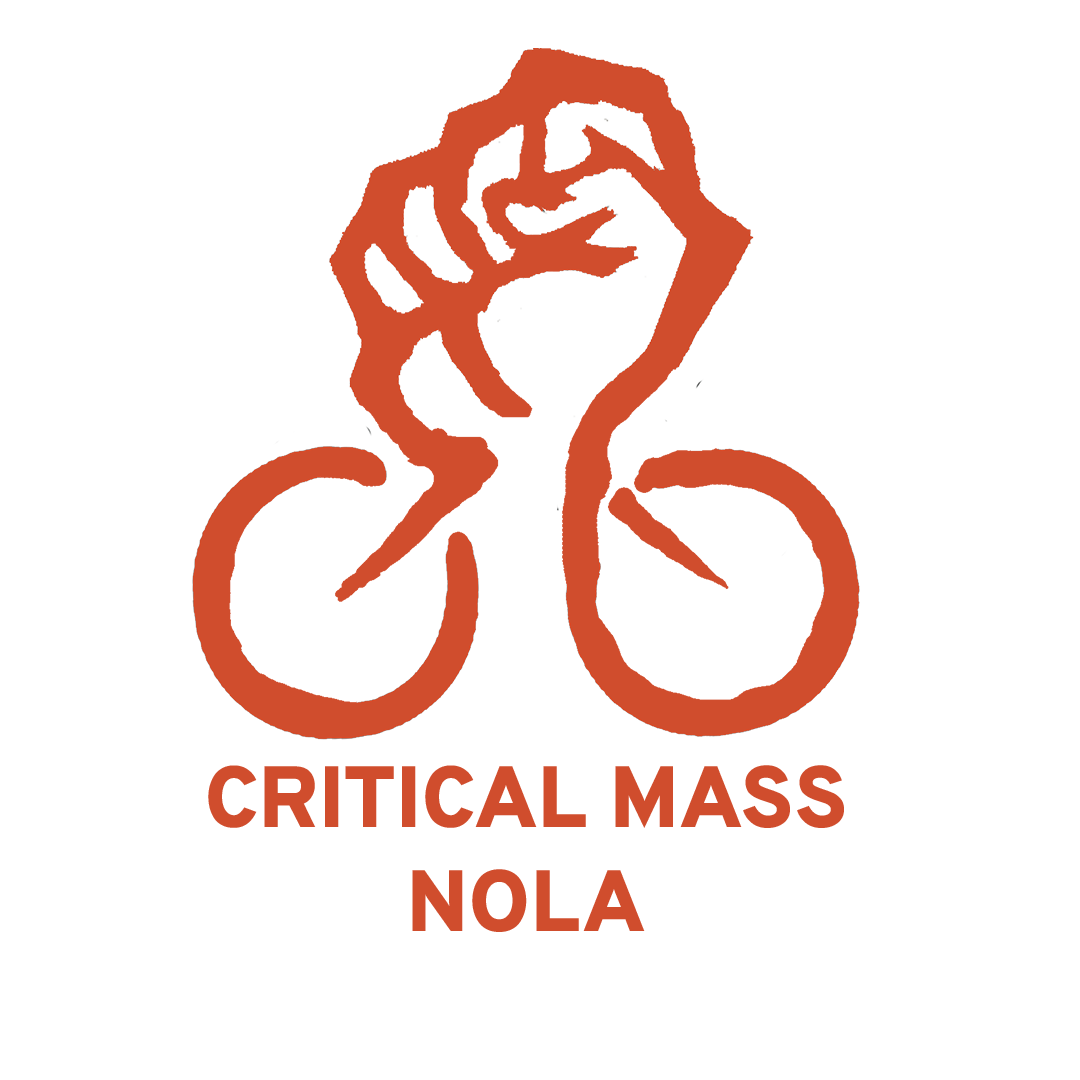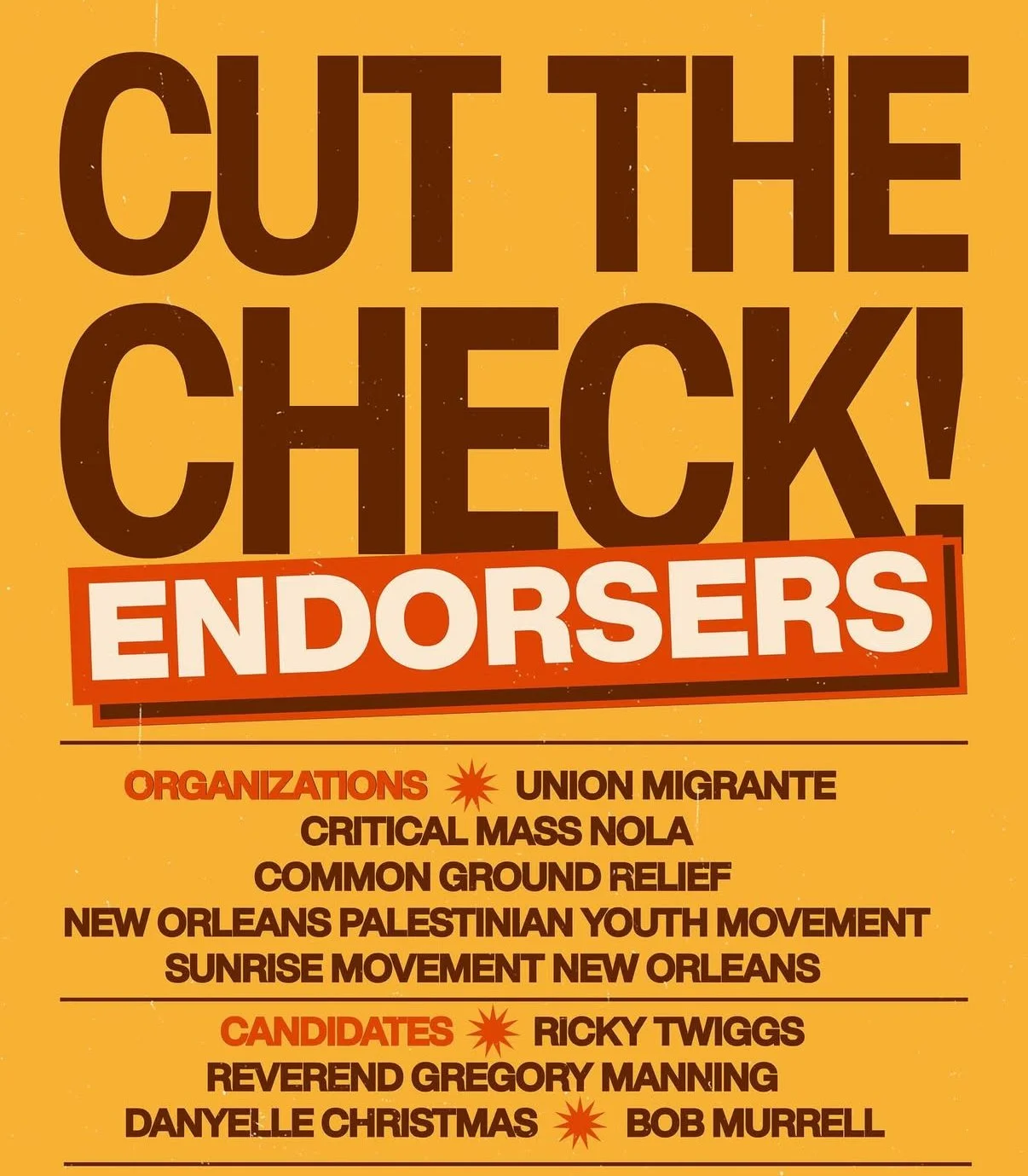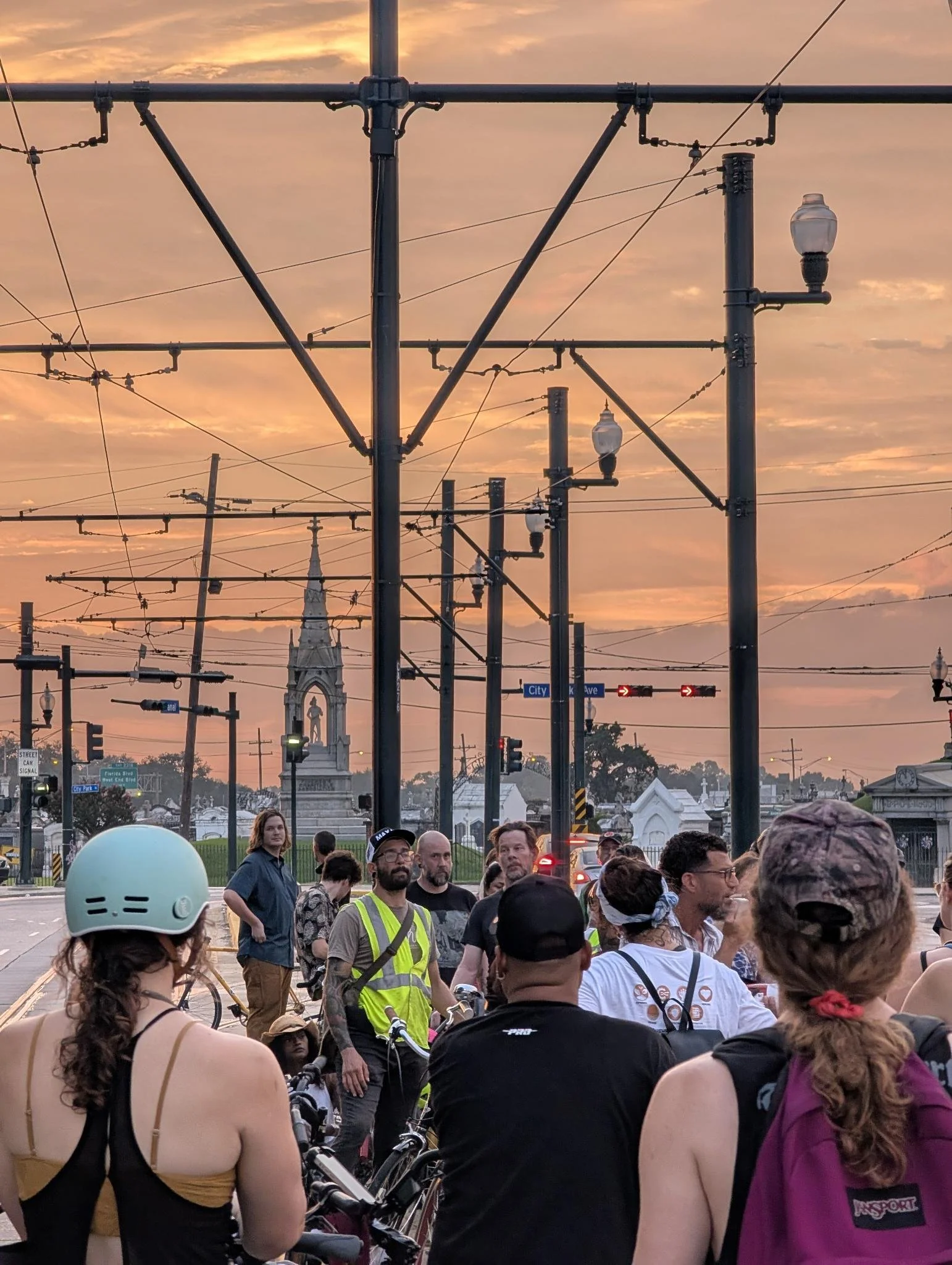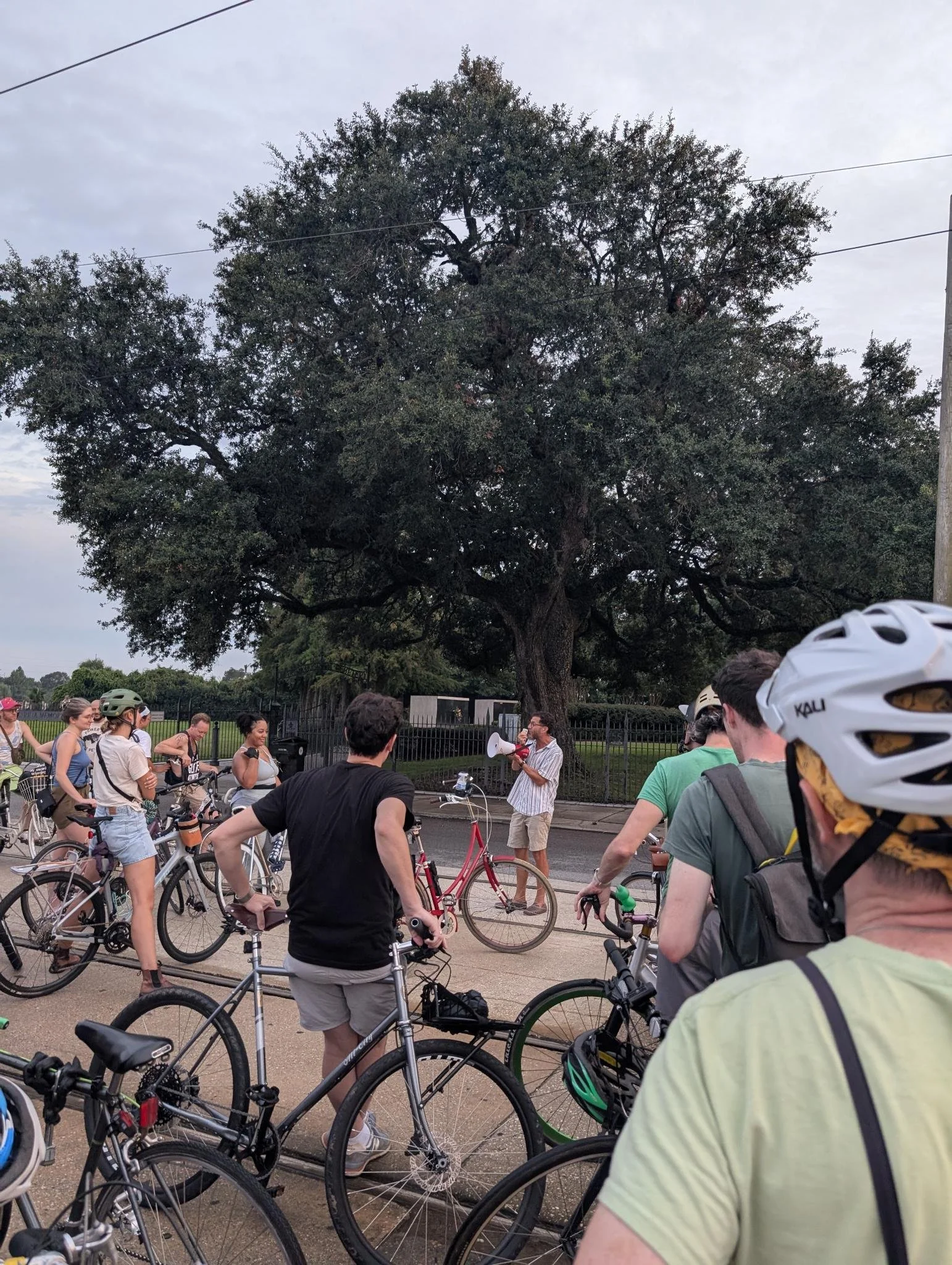Cut The Check! Twenty Years After Katrina, the Struggle for Justice Continues
All over the globe this past Friday, Critical Mass took to the streets to declare that bicycles have a right to the road. Here in New Orleans, our ride carried a more profound weight. August 29th was the 20th anniversary of the levee breaches that drowned our city. We registered our ride with Taproot Earth and the Katrina 20 Week of Action. While we took our traditional route, reclaiming major streets, we also made our way to the Katrina Memorial at the end of Canal Street. There, we gathered in reflection and silence. Members of the Louisiana branch of the Party for Socialism and Liberation (PSL) shared their Cut the Check campaign with us—a program that speaks directly to the unfinished struggle for justice, calling for centralized, people-powered governance where communities themselves determine their future.
Critical Mass Nola in Front of the Hurricane Katrina Memorial on Canal Street.
Hurricane Katrina is remembered not simply for a storm but for an atrocity of governance. Hurricane Katrina was powerful, but the catastrophe that followed was no act of nature. It was the culmination of systemic racism, capitalist neglect, and state violence against the poor and Black residents of this city. More than 1,800 lives were lost and hundreds of thousands displaced, as federal, state, and local authorities abandoned New Orleans in its hour of greatest need. Katrina revealed the brutal priorities of a system that protects profit and property while discarding human beings.
The Lower Ninth Ward, a historic Black community, drowned under fifteen feet of water after defective levees—long known to be flawed—collapsed. Residents were left to wade through floodwaters filled with corpses, scavenging for food for their families, only to be brutalized by police who threatened to kill them for “looting.” The city offered no transportation for the 100,000 residents without cars; instead, the stranded were herded into the Superdome and Convention Center, where people languished in filth under the watch of armed soldiers. The National Guard was deployed not to rescue lives, but to “shoot to kill” anyone searching for food or water. The Danziger Bridge, is an example of this police repression where innocent survivors were murdered. This was not “government failure”—it was capitalism working as intended: protecting property while letting poor and Black residents die.
Solidarity Across Borders: Cuba’s Offer of Aid
While Washington abandoned New Orleans, another vision of solidarity emerged from across the Caribbean. Cuba—under Fidel Castro—offered to send nearly 1,600 doctors with 36 tons of medical supplies, prepared to arrive within 12 hours. The Bush administration rejected the offer, preferring that thousands suffer rather than accept assistance from a socialist neighbor.
That rejection was telling, but so was the offer. Out of that moment was born the Henry Reeve International Medical Brigade, named after a Brooklyn-born volunteer in Cuba’s independence struggle. Since Katrina, the brigade has treated millions of people across more than 40 countries, from earthquakes to epidemics to the COVID-19 pandemic. Washington has tried to sabotage this humanitarian work, but Cuba’s doctors embody a principle the United States refuses to acknowledge. That healthcare is a human right, not a commodity. The contrast is glaring—while the U.S. left Black New Orleanians to drown, Cuba mobilized its people to heal strangers abroad.
Disaster Capitalism and the Theft of a City
What followed Katrina was not recovery but plunder. Developers and corporations treated the storm as a “blank slate” to reshape the city for profit. Public housing—the backbone of working-class Black New Orleans—was demolished despite being structurally sound. Seven thousand public housing units were reduced to a few hundred “mixed-income” apartments, stripping residents of both homes and tenant rights.
The city’s public schools were destroyed and replaced by an all-charter system. Over 7,000 teachers—mostly Black women—were fired en masse, their union crushed. Black families were forced out as rents doubled and neighborhoods gentrified. The “Road Home” program funneled billions to contractors while shortchanging Black homeowners. This was Naomi Klein’s “disaster capitalism” in motion: privatization, dispossession, and the transformation of New Orleans into a tourist playground while its people scattered.
Cut The Check: A Campaign for Justice and Survival
Two decades later, the wounds remain open. Forty-three percent of Black children live in poverty. Tens of thousands of vacant homes and lots sit idle while thousands remain unhoused. Public services are corrupt and collapsing, yet the developer class thrives. And the storms keep coming, intensified by the climate crisis.
This is why Critical Mass Nola endorses the Cut The Check! campaign. Organized by PSL, the campaign demands people-first hurricane policies. Its central demands include:
Immediate release of the $600 million in unspent FEMA funds allocated over a decade ago for infrastructure repairs.
Full transparency and accountability in disaster relief spending.
Expansion of the city-assisted evacuation program so no resident is ever abandoned again.
Investment in emergency preparedness that prioritizes human life.
For us, endorsing Cut The Check is not simply symbolic. It reflects the same principle we ride for every month. That mobility, safety, and survival are collective rights, not privileges granted by the oligarchy.
Toward a Just Future
Major storms with the devastating effects of Hurricane Katrina exposes the same truth—under capitalism, disasters are not natural but manufactured. The levees failed because cost-cutting prevailed. People died because the state chose to guard property, not rescue families. Communities remain displaced because developers saw opportunity where residents saw home. Katrina was not an aberration—it was a preview of the disasters that await as climate collapse accelerates.
But another future is possible. A socialist response would mean democratic control over housing, infrastructure, and disaster planning. It would mean evacuation programs that guarantee no one is left behind. It would mean turning vacant homes into shelter, not investment portfolios. It would mean prioritizing solidarity, over the hoarding of wealth.
Twenty years later, Katrina remains both a wound and a warning. The billionaire class has shown what they will do when disaster strikes. The question is what we, the working class, will do in response.
Cut the check. Fund the people. Build a future where survival is not a matter of profit, but a matter of right.
- Eric Gabourel



